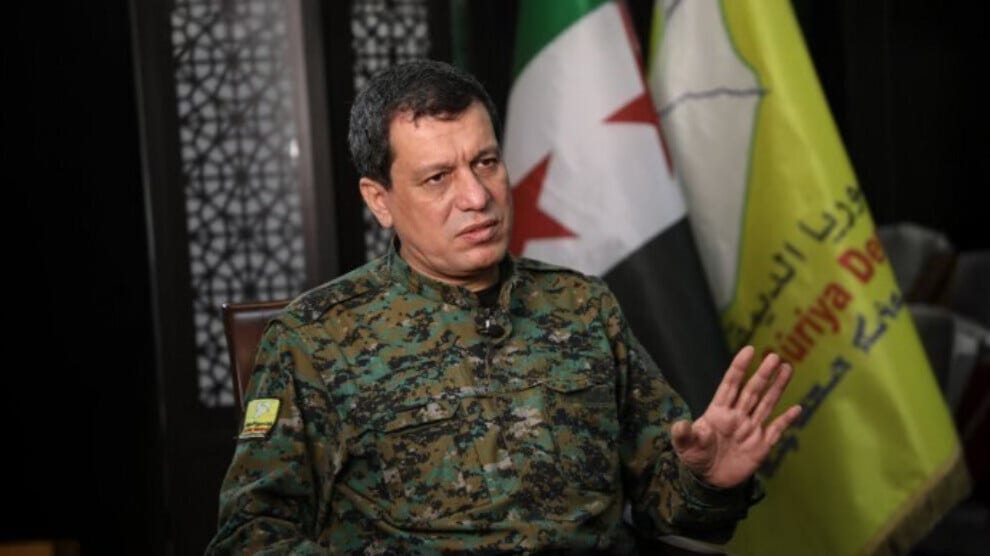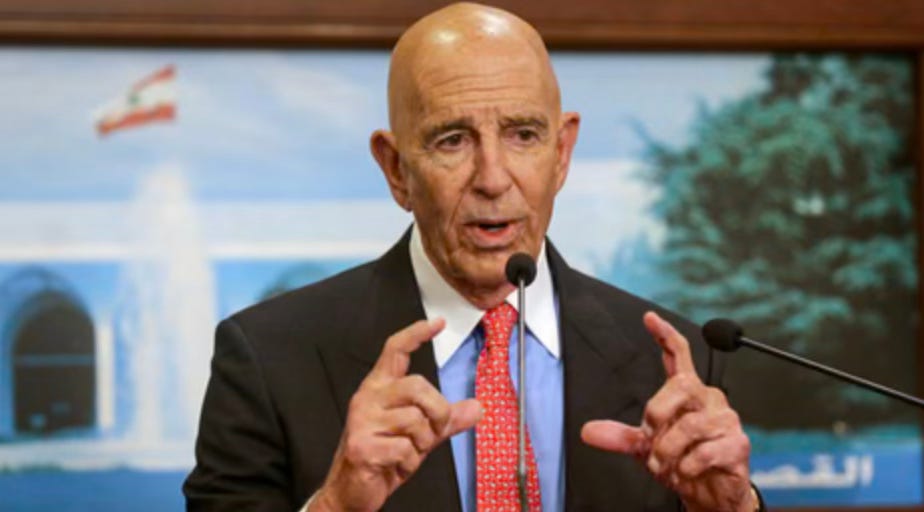Which Syrian Army Should the Kurds Join?
While US’s Syria envoy rose to the apogee of Orientalism by lecturing Lebanese journos to “be civilised,” the real deadlock sits among Damascus-Rojava-Ankara where he is the negotiator! Bad luck!
We have a problem that could set off a domino effect from Damascus to Ankara to Tel Aviv.
Turkey has several concerns and objectives in Syria. This makes life harder for two major indigenous actors, the al-Sharaa government in Damascus and the Syrian Democratic Forces led by Mazlum Abdi in Rojava, and irritates one external actor, Israel.
On 10 March 2025, Mazlum Abdi and his administration signed a deal with the Damascus government to join Syria’s new state institution. The announcement was presented as a declaration of unity, yet the meaning of “joining” was left open. It could follow different timelines, carry conditions, and serve diverging objectives. Soon it became clear that the deal was more a gesture of acknowledgment than a binding framework, and that each side understood it in its own way.
The Sharaa government insists on a unitary Syria. Still, it had initially left some room for an autonomous Kurdish region, with conditions of administration to be discussed later. Turkey’s government, however, is pressing Damascus to reach an agreement shaped by Turkish interests and security concerns.
The negotiations between Damascus and Rojava are now at a deadlock. The US Syria envoy and ambassador to Turkey, Tom Barrack, is involved, constantly adjusting his words to avoid angering Turkey while trying not to abandon the Kurds. He is seen as untrustworthy in Ankara. I believe both Sharaa and Abdi share this sentiment. At least there is one point of convergence between Hakan Fidan, al-Sharaa, and Mazlum Abdi.
Nevertheless, Barrack—or anyone representing the US—remains indispensable for restructuring the Syrian state, yet mistrust shadows his every step.
The crux of the matter is this: Turkey wants the SDF to be folded into the Syrian military. Ankara sees the SDF as a national security threat, a force on its border that shares the ideology and operational culture of the PKK, which has fought a forty-year war against the Turkish state and left almost 60,000 dead, both Turks and Kurds.
Here things become curious.
Turkey wants the SDF, some 70,000 disciplined fighters, to join a Syrian army that barely exists. Damascus has perhaps 20,000 men, including foreign fighters, many radical and undisciplined, some responsible for atrocities against Alawites and Druze in Suwayda. The SDF does not want to dissolve itself into this shaky entity and expose the Kurdish population, which has already suffered persecution and massacres in the past. That the perpetrators were Assad’s forces, and that al-Sharaa is anti-Assad, hardly provides security guarantees for Rojava.
At the same time, Turkey has launched a parallel track with Abdullah Öcalan, the imprisoned PKK leader and ideological father of the Kurdish components of the SDF. Öcalan called for the PKK to disarm and disband, a call the movement heeded, marking a historic end to armed struggle. (See earlier posts.)
Few observers fluent in Kurdish and Turkish politics could explain why Öcalan wanted the PKK to disband when Turkey was sinking deeper into authoritarianism and Syria into turmoil. There was little to gain in terms of democratic reforms or cultural rights for the Kurds. The main gain was this: Turkey would stop attacking Rojava. That indeed happened after the PKK dissolved. Without the PKK as a designated terrorist actor, Turkey could open direct talks with the SDF. It has since maintained contact with both Rojava and the SDF.
But military integration remains the obstacle. Öcalan told Abdi and others that the SDF should be a key actor in a democratic Syria, without seeking independence, and that ultimately there cannot be two armies in a single state. Yet as the recent clashes against Alawites and Druze show, the Syrian state is weak, its military incoherent, and far from democratic. Under these conditions, Öcalan does not pressure the SDF to hand over its weapons and agrees with Abdi that Kurdish security must come first.
So, who will provide that guarantee? Into which army would the Kurds integrate and feel safe?
There is no such army. So the SDF stalls. However this is unacceptable for Turkey. The resolution of the Kurdish question inside Turkey now hinges on this very issue. Recognizing the SDF as legitimate and tacitly condoning an autonomous administration in Rojava may be on the horizon and part of the “honourable exits strategy” I have written about. Yet a standing 70,000-strong SDF army is Ankara’s red line.
Meanwhile, Turkey signed a military cooperation agreement with Damascus in mid-August. It promises coordination, training, consultancy, intelligence exchange, procurement of weapons and logistics. In practice, this means heavy Turkish involvement in Damascus and influence over the restructuring of the Syrian military. Israel is deeply uneasy about this.
Remember: After the initial talks in February on security and military cooperation between Damascus and Ankara, which would allow Turkish forces to train at two Syrian bases, Israel struck one of those bases including Hama military airport and the T4 base near Homs. As the BBC put it, ‘the air strikes hit Syria, but their real target was Turkey.’
Now things get more curious here. Israel is also pursuing a US-mediated security deal with Syria. Sharaa confirmed this week that his government was in “advanced” talks with Israel on the basis of the 1974 disengagement lines, though he downplayed prospects for a peace deal. The discussions centred on reducing tensions, respecting Syria’s sovereignty, and pursuing arrangements to bolster regional stability. Barrack, shuttling between Netanyahu and Sharaa, pitched this as constructive dialogue. Yet Israeli sources, speaking on condition of anonymity to Al-Monitor, admitted the real obstacle is Turkey. Erdogan will not surrender influence in Syria, and Israel sees Foreign Minister Fidan as the one effectively “managing” Sharaa. Barrack’s aim, according to these accounts, is less to reconcile Syria and Israel than to draw lines between Israel and Turkey and define red zones of influence.
So, what next?
Foreign Minister Fidan urges the SDF to finalize the 10 March agreement with Damascus. But common-sense dictates that a sudden handover of arms and absorption into Syrian units under Turkish supervision will not work.
Al-Sharaa has shown he cannot control radicals within his government and has failed to protect minorities as promised.
Still, Western and regional powers, particularly Saudi Arabia, have invested heavily in him. Short and medium-term stability in Syria is being calculated with him in power. The SDF needs to accept this reality.
At the same time, Turkey, for the sake of stability and of its own peace process with the Kurds, should avoid pushing for an impossible outcome on an impossible timeline.
What this space urgently needs is patience, trust, and a genuine show of goodwill from all three parties - Sharaa government, SDF and Turkey -, with the greatest share falling on the most powerful of them: Turkey.
As I finished writing, I came across a video of Tom Barrack in Lebanon, rising to the apogee of Orientalism. After meeting the Lebanese president, Joseph Aoun, Barrack faced a room full of reporters. “We’re going to have a different set of rules. Please be quiet for a moment. The moment this starts becoming chaotic, like animalistic, we’re gone,” he said. “Act civilised, act kind, act tolerant, because this is the problem with what’s happening in the region.”
Well, well. No “animalistic chaos,” but civilisation, he wants. ‘Vay anasını sayın seyirciler’, as we say in Turkish.
We have neither the time nor the patience to remind Mr Barrack that most of the region’s problems flow from his country’s endless meddling and lust for Middle Eastern oil. He is not in Lebanon, Turkey, or Syria out of charity, nor is his boss. He is there for power, money, and control. Duh.
How he intends to play the role of mediator, after such faux pas, is anyone’s guess.
So, it would be best if Turks, Kurds, and Arabs dealt with these problems themselves, so that poor old patronising Barrack can return to his real estate business in his highly civilised(!) country.




Barrack really is the gift that keeps on giving!